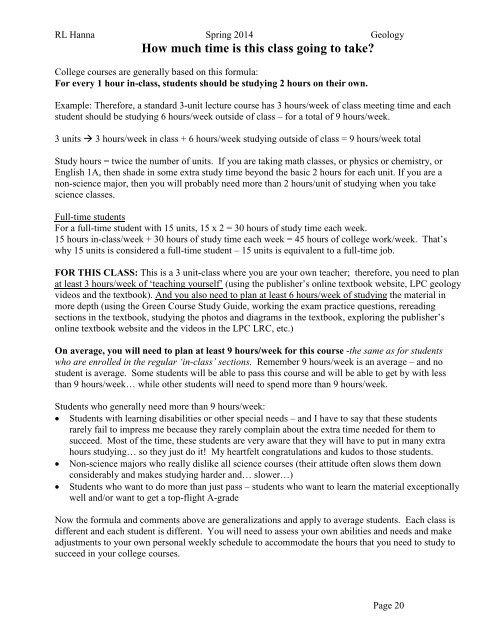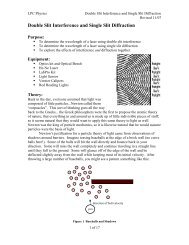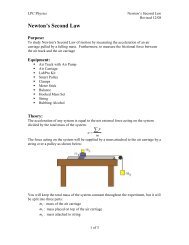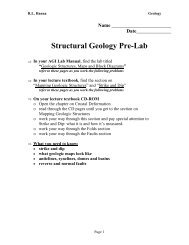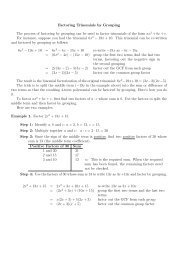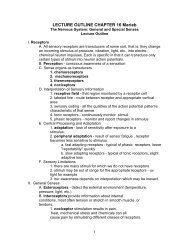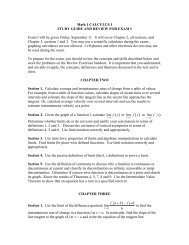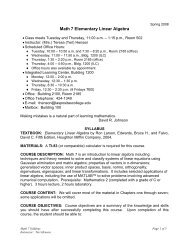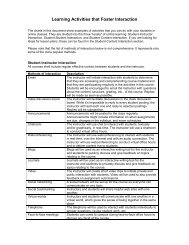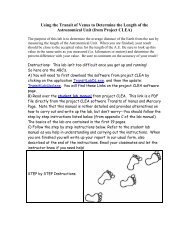Download - Las Positas College
Download - Las Positas College
Download - Las Positas College
Create successful ePaper yourself
Turn your PDF publications into a flip-book with our unique Google optimized e-Paper software.
RL Hanna Spring 2014 GeologyHow much time is this class going to take?<strong>College</strong> courses are generally based on this formula:For every 1 hour in-class, students should be studying 2 hours on their own.Example: Therefore, a standard 3-unit lecture course has 3 hours/week of class meeting time and eachstudent should be studying 6 hours/week outside of class – for a total of 9 hours/week.3 units 3 hours/week in class + 6 hours/week studying outside of class = 9 hours/week totalStudy hours = twice the number of units. If you are taking math classes, or physics or chemistry, orEnglish 1A, then shade in some extra study time beyond the basic 2 hours for each unit. If you are anon-science major, then you will probably need more than 2 hours/unit of studying when you takescience classes.Full-time studentsFor a full-time student with 15 units, 15 x 2 = 30 hours of study time each week.15 hours in-class/week + 30 hours of study time each week = 45 hours of college work/week. That’swhy 15 units is considered a full-time student – 15 units is equivalent to a full-time job.FOR THIS CLASS: This is a 3 unit-class where you are your own teacher; therefore, you need to planat least 3 hours/week of ‘teaching yourself’ (using the publisher’s online textbook website, LPC geologyvideos and the textbook). And you also need to plan at least 6 hours/week of studying the material inmore depth (using the Green Course Study Guide, working the exam practice questions, rereadingsections in the textbook, studying the photos and diagrams in the textbook, exploring the publisher’sonline textbook website and the videos in the LPC LRC, etc.)On average, you will need to plan at least 9 hours/week for this course -the same as for studentswho are enrolled in the regular ‘in-class’ sections. Remember 9 hours/week is an average – and nostudent is average. Some students will be able to pass this course and will be able to get by with lessthan 9 hours/week… while other students will need to spend more than 9 hours/week.Students who generally need more than 9 hours/week:• Students with learning disabilities or other special needs – and I have to say that these studentsrarely fail to impress me because they rarely complain about the extra time needed for them tosucceed. Most of the time, these students are very aware that they will have to put in many extrahours studying… so they just do it! My heartfelt congratulations and kudos to those students.• Non-science majors who really dislike all science courses (their attitude often slows them downconsiderably and makes studying harder and… slower…)• Students who want to do more than just pass – students who want to learn the material exceptionallywell and/or want to get a top-flight A-gradeNow the formula and comments above are generalizations and apply to average students. Each class isdifferent and each student is different. You will need to assess your own abilities and needs and makeadjustments to your own personal weekly schedule to accommodate the hours that you need to study tosucceed in your college courses.Page 20


